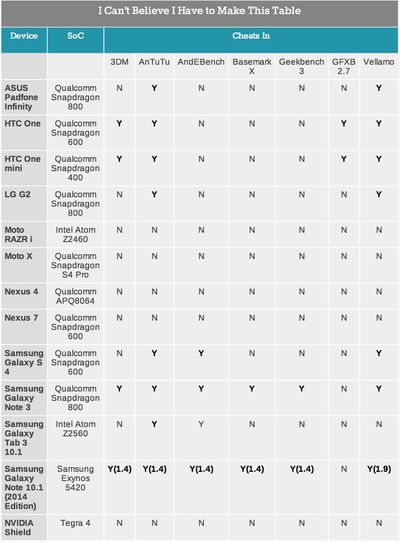Nearly All Mobile Device Makers Cheat on Benchmarks, Except Apple and Motorola
Following Tuesday's report that Samsung artificially inflates its benchmarking scores, well-respected hardware review site AnandTech has published evidence suggesting nearly all mobile manufacturers, with the exception of Apple and Motorola, use CPU/GPU optimizations to game benchmark tests.
Samsung and other OEMs use a variety of methods to enhance device performance when a benchmark is detected. For example, with its Galaxy S 4 Samsung raised its thermal limits (and max GPU frequency) to get an edge on certain benchmarks and also raised its CPU voltage/frequency to its highest state when a benchmark was sensed, a tactic engaged by multiple manufacturers like LG, HTC, and ASUS as well.
In the table below, Anandtech highlights devices that detect benchmarks and immediately respond with max CPU frequency.

With the exception of Apple and Motorola, literally every single OEM we’ve worked with ships (or has shipped) at least one device that runs this silly CPU optimization. It’s possible that older Motorola devices might’ve done the same thing, but none of the newer devices we have on hand exhibited the behavior. It’s a systemic problem that seems to have surfaced over the last two years, and one that extends far beyond Samsung.
AnandTech notes that it’s a continual "cat and mouse" game discovering which devices have optimized for which benchmarks, because targeted benchmarks must be avoided.
The only realistic solution is to continue to evolve the suite ahead of those optimizing for it. The more attention you draw to certain benchmarks, the more likely they are to be gamed. We constantly play this game of cat and mouse on the PC side, it's just more frustrating in mobile since there aren’t many good benchmarks to begin with. […]
There's no single solution here, but rather a multi-faceted approach to make sure we’re ahead of the curve. We need to continue to rev our test suite to stay ahead of any aggressive OEM optimizations, we need to petition the OEMs to stop this madness, we need to work with the benchmark vendors to detect and disable optimizations as they happen and avoid benchmarks that are easily gamed.
Despite all of the effort that OEMs put into benchmark optimizations, the gains are negligible. The impact on CPU tests revealed a 0 to 5 percent performance increase, and a less than 10 percent increase on GPU benchmarks.
Popular Stories
Apple is not expected to release a standard iPhone 18 model this year, according to a growing number of reports that suggest the company is planning a significant change to its long-standing annual iPhone launch cycle.
Despite the immense success of the iPhone 17 in 2025, the iPhone 18 is not expected to arrive until the spring of 2027, leaving the iPhone 17 in the lineup as the latest...
Language learning app Duolingo has apparently been using the iPhone's Live Activity feature to display ads on the Lock Screen and the Dynamic Island, which violates Apple's design guidelines.
According to multiple reports on Reddit, the Duolingo app has been displaying an ad for a "Super offer," which is Duolingo's paid subscription option.
Apple's guidelines for Live Activity state that...
The company behind the BlackBerry-like Clicks Keyboard accessory for the iPhone today unveiled a new Android 16 smartphone called the Clicks Communicator.
The purpose-built device is designed to be used as a second phone alongside your iPhone, with the intended focus being communication over content consumption. It runs a custom Android launcher that offers a curated selection of messaging...
Apple plans to introduce a 12.9-inch MacBook in spring 2026, according to TrendForce.
In a press release this week, the Taiwanese research firm said this MacBook will be aimed at the entry-level to mid-range market, with "competitive pricing."
TrendForce did not share any further details about this MacBook, but the information that it shared lines up with several rumors about a more...
Apple is planning to release a low-cost MacBook in 2026, which will apparently compete with more affordable Chromebooks and Windows PCs. Apple's most affordable Mac right now is the $999 MacBook Air, and the upcoming low-cost MacBook is expected to be cheaper. Here's what we know about the low-cost MacBook so far.
Size
Rumors suggest the low-cost MacBook will have a display that's around 13 ...
Apple today announced a number of updates to Apple Fitness+ and activity with the Apple Watch.
The key announcements include:
New Year limited-edition award: Users can win the award by closing all three Activity Rings for seven days in a row in January.
"Quit Quitting" Strava challenge: Available in Strava throughout January, users who log 12 workouts anytime in the month will win an ...
Govee today introduced three new HomeKit-compatible lighting products, including the Govee Floor Lamp 3, the Govee Ceiling Light Ultra, and the Govee Sky Ceiling Light.
The Govee Floor Lamp 3 is the successor to the Floor Lamp 2, and it offers Matter integration with the option to connect to HomeKit. The Floor Lamp 3 offers an upgraded LuminBlend+ lighting system that can reproduce 281...























